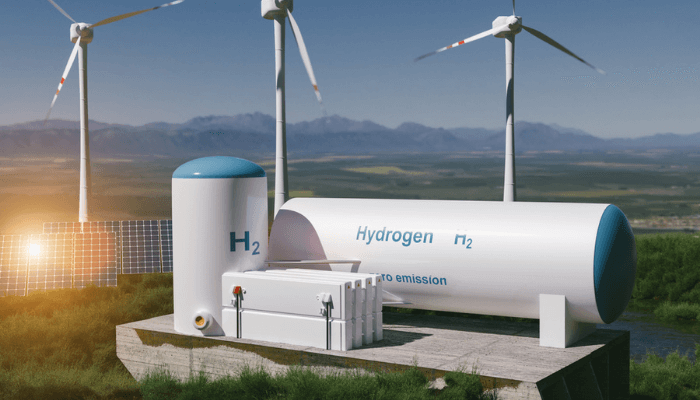
In order to capitalize on the global hydrogen economy, which is expected to reach $200 billion by 2030, the federal government on Tuesday, November 26, called for investments in infrastructure enhancements.
During the first national conference and exhibition on hydrogen in Abuja, Ambassador Nicholas Ella, Permanent Secretary of the Ministry of Petroleum Resources, made this call.
The Foundation for Sustainable Social Responsibility in Emerging Africa (FOSSREA) and the Federal Ministry of Petroleum Resources planned it together.
The National Conference on Hydrogen offers a forum for important conversations on the infrastructure, funding, policy, and technology required to create a strong hydrogen economy, according to the Permanent Secretary.
According to him, Nigeria needs to make large investments in developing electrolysers for the production of green hydrogen, modernizing its infrastructure, and establishing supportive legislative frameworks in order to get a piece of this growing market.
Read Also: Reps call on Nigerian government to secure Transmission Towers in Rivers, Bayelsa
He stated that sharing the most recent scientific discoveries and technical developments in hydrogen production, storage, distribution, and use is one of the conference’s goals.
Together, nations like South Korea, Japan, and Germany have already committed more than $70 billion by 2023 to the development of hydrogen supply chains and technology.
He says this emphasizes how crucial it is for Nigeria to present itself as an investment-friendly country that can draw comparable foreign funding and collaborations.
He went on to say that having substantive policy conversations is the main goal of the conference.
According to him, the discussions are crucial as the nation creates laws that guarantee security and advance industry norms for the use of hydrogen.
According to recent research, the worldwide use of hydrogen may cut CO2 emissions by up to 6 gigatons a year by 2050, he claimed.
He added that incorporating hydrogen into Nigeria’s energy environment can help the country meet its Nationally Determined Contributions (NDCs), which call for a 20% reduction in carbon emissions by 2030.
In order to address the expected $50 billion investment required for Nigeria’s energy transformation, as projected by several financial analysts, the Permanent Secretary stated that the private sector’s engagement is essential.
He went on to say, “We are dedicated to advancing blue hydrogen by making use of current gas supplies and making sure that green hydrogen projects comply with international sustainability requirements.
Building capacity is a crucial part of this commitment. The goal of this conference’s workshops and training sessions is to give Nigerian professionals the technical know-how they need to work and innovate in the hydrogen industry.
Although hydrogen has a lot of promise, there are also a lot of difficulties. Green hydrogen generation currently costs about $4 to $6 per kilogram, but by 2030, it should drop to $1 to $2 per kilogram due to greater production scale and technological developments.
Infrastructure development is still a significant obstacle that requires concerted efforts from business and government partners, including the building of pipelines, hydrogen refueling stations, and export facilities.
However, these difficulties offer special chances for economic expansion, job creation, and innovation. By 2035, it is anticipated that a hydrogen-based economy in Nigeria will provide more than 300,000 direct and indirect jobs in the manufacturing, engineering, and service sectors.
Vice President Kasim Shettima spoke and remembered that the 2015 Paris Agreement, which was ratified by 196 parties at COP21, established the framework for discussions on climate change during the past ten years.
The energy transition strategy in Nigeria, he said, has set an ambitious target to achieve a net-zero economy by 2060, with natural gas as a key transition fuel and a commitment to achieving 9GW of renewable electric power supply by 2030.
Speaking on behalf of Sadiq Waka, the Special Adviser to the President on Power, he stated that in order to meet Nigeria’s ambitious goals, it is essential to develop a strong and diverse energy mix that takes into account the availability of local resources. In this regard, hydrogen has become a significant fuel for Nigeria’s energy future.
Read Also: CBN’s MPC Hikes Interest Rate Again to 27.5%
He claims that by 2050, the demand for hydrogen is predicted to soar from about 95 million tons presently to over 500 million tons. Currently making up less than 2% of the world’s energy consumption, hydrogen might increase to 10% by 2050 and, according to some estimates, as much as 20% by that time.
“The potential for hydrogen to meet our domestic energy demands, service our burgeoning petrochemicals industry, and reshape our energy trade through exports, given our vast natural gas and renewable energy resources as a nation, cannot be overestimated,” he continued.
It is anticipated that the global market for hydrogen technology will expand rapidly, surpassing $200 billion by 2030.